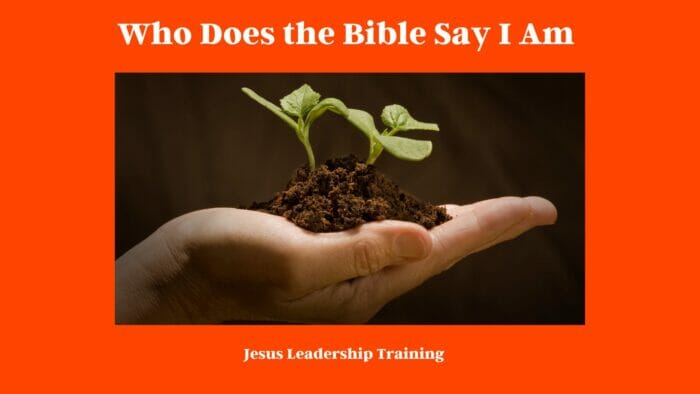Who Does the Bible Say I Am – The Bible is a source of knowledge for many people and provides guidance for life. It is full of wisdom, and its teachings can be used to help us understand who we are. In the Bible, Jesus says “I am the way, the truth, and the life” (John 14:6). This statement is a powerful message about who we are and our relationship to God. The Bible teaches that we are beloved creations of God, made in His image and likeness (Genesis 1:27). We are also beloved children of God, chosen to be part of His family (Ephesians 1:3-6). God created us to be His special people, with unique gifts and talents (Romans 12:6-8). The Bible also says that we are to love God and others, to honor Him, and to live our lives in obedience and service (Matthew 22:37-39). As we come to understand who the Bible says we are, we can live our lives in a way that honors God and blesses others.
Table of Contents
Who Does the Bible Say I Am
The Bible is a powerful source of knowledge and guidance. It has been used to shape cultures and societies for centuries and continues to be a major source of inspiration and insight. As Christians, it is important to understand and embrace our identity as children of God. In this blog post, we will explore who the Bible says we are, discovering how we can use its teachings to shape our lives.

Created in God’s Image: Understanding What the Bible Says
The Bible is clear that we are made in the image of God. Genesis 1:27 states, “So God created mankind in his own image, in the image of God he created them; male and female he created them.” This verse reveals that we are created with purpose and intent, with the image of God in our very being. We are made with purpose and have the ability to choose how we live our lives.

Embracing God’s Self-Will: Exploring What the Bible Says
God gave us free will so that we can make our own choices. Deuteronomy 30:19-20 reads, “I call heaven and earth to witness against you today, that I have set before you life and death, blessing and curse. Therefore choose life, that you and your offspring may live.” God gave us the power to choose what we do and how we live, making us accountable for our choices. We must understand that we will be held accountable for our choices and live our lives in accordance with God’s self-will.
What the Bible Says Pros and Cons of Free Will
Pros of Free Will:
- Freedom of Choice: Free will gives us the ability to make our own choices and decisions. We are able to choose between good and bad, right and wrong, and even between different paths. This freedom gives us the power to determine our own fate and shape our own lives.
- Responsibility: Free will allows us to take responsibility for our actions. When we are able to choose our own actions, we are able to accept the consequences of those actions. This encourages us to make the right choices and act in a responsible manner.
- Moral Agency: Free will gives us the power to act in accordance with our moral beliefs and values. We are able to make ethical decisions and take action in accordance with our beliefs and values, which enhances our moral character.
- Self-Determination: Free will allows us to determine our own destiny. We are able to make decisions that will shape our lives and our future, allowing us to pursue our own dreams and goals.
Cons of Free Will:
- Misuse: Free will gives us the power to make our own choices, but it also gives us the power to make bad choices. This can lead to dangerous and harmful consequences if we misuse our free will.
- Guilt and Shame: Free will can lead to feelings of guilt and shame when we make bad decisions or do something wrong. This can lead to a sense of regret or self-loathing, which can be very difficult to cope with.
- Conflict: Free will can lead to conflict if two people have different opinions on what is right and wrong. This can lead to arguments, disagreements and even violence if the differences become too great.
- Anxiety: Free will also can create feelings of anxiety, as we have to make difficult decisions and accept the consequences of our actions. This can be a very difficult and stressful process.
Ruling the Earth: Exploring What the Bible Says
The Bible also speaks of our responsibility to rule the earth. Genesis 1:28 states, “And God blessed them. And God said to them, “Be fruitful and multiply and fill the earth and subdue it and have dominion over the fish of the sea and over the birds of the heavens and over every living thing that moves on the earth.” We are given the power to rule the earth and we must use it wisely. We must use our power to make the world a better place and to care for the environment.
Bible Responsibilities that Children of God in Ruling the Earth
- Respect God’s Sovereignty: Children of God have a responsibility to respect God’s sovereignty and obey His commands. Deuteronomy 6:5 says, “Love the Lord your God with all your heart and with all your soul and with all your strength.”
- Follow God’s Laws: Children of God are also responsible for following all of God’s laws. Leviticus 19:18 says, “Do not seek revenge or bear a grudge against anyone among your people, but love your neighbor as yourself. I am the Lord.”
- Take Care of Creation: Children of God have the responsibility to take care of God’s creation. Genesis 1:26-28 says, “Let us make mankind in our image, in our likeness, so that they may rule over the fish in the sea and the birds in the sky, over the livestock and all the wild animals, and over all the creatures that move along the ground.”
- Love One Another: Children of God have a responsibility to love one another. John 13:34 states, “A new command I give you: Love one another. As I have loved you, so you must love one another.”
- Serve God: Children of God have a responsibility to serve God and to serve others. Matthew 25:40 says, “The King will reply, ‘Truly I tell you, whatever you did for one of the least of these brothers and sisters of mine, you did for me.’”
- Be Accountable: Children of God have a responsibility to be accountable to God and to others. Matthew 5:16 says, “Let your light shine before others, that they may see your good deeds and glorify your Father in heaven.”
- Pursue Righteousness: Children of God are also responsible for pursuing righteousness. Romans 12:2 states, “Do not conform to the pattern of this world, but be transformed by the renewing of your mind. Then you will be able to test and approve what God’s will is—his good, pleasing and perfect will.”

Preparing for Eternity: What the Bible Says
It is important to remember that our lives on earth are not eternal. In 2 Corinthians 5:10, it says, “For we must all appear before the judgment seat of Christ, so that each one may receive what is due for what he has done in the body, whether good or evil.” We must live our lives in such a way that we are prepared for eternity. We must strive to live a life of righteousness and holiness in order to be prepared for eternity.
Recognizing Ourselves as God’s Children: What the Bible Says
The Bible also speaks of our identity as children of God. In 1 John 3:1 it says, “See what kind of love the Father has given to us, that we should be called children of God; and so we are.” We are children of God and we must recognize and embrace this identity. We must strive to live a life that is pleasing to God and to be a good example to those around us.
Bible Responsibilities that the Children of God Have (I am a Child of God)
- Love the Lord with all your heart (Deuteronomy 6:5): (Great Love – God Love) This verse calls us to love the Lord with all our heart, soul, and strength. We are to make our relationship with God our highest priority, loving Him more than anything else.
- Love your neighbor as yourself (Mark 12:31): This verse calls us to love our neighbor as we love ourselves. We are to treat them with kindness, compassion, and respect, just as we would treat ourselves.
- Be kind and forgiving (Ephesians 4:32): This verse calls us to be kind and forgiving towards each other. We should put away our anger and bitterness and instead show grace and mercy to others.
- Pray without ceasing (1 Thessalonians 5:17): This verse calls us to always be in communication with God. We should make prayer an everyday habit, lifting up our requests, praise, and thanksgiving to Him.
- Be filled with the Holy Spirit (Ephesians 5:18): This verse calls us to be filled with the Holy Spirit and to allow Him to lead and guide us in all we do. We should seek to live our lives in accordance with His will and purpose.
- Walk in the Spirit (Galatians 5:16): This verse calls us to walk in the Spirit and not after the desires of the flesh. We should strive to please the Lord by living righteously and obeying His commands.
- Glorify God in all you do (1 Corinthians 10:31): This verse calls us to bring glory to God in all we do. We should do our best to make sure our lives reflect His character, and strive to honor Him in all we do.

Getting to Know the Bible: Understanding Who We Are
In order to understand our identity as children of God, it is important to get to know the Bible. We must learn and understand the teachings of the Bible in order to better understand our identity as children of God. We must read and study the Bible in order to gain a better understanding of who we are and who God created us to be.
Exploring Biblical Verses: Discovering Who We Are
We can explore biblical verses to gain further insight into who we are. One such verse is found in Isaiah 43:1-2, which reads, “But now thus says the Lord, he who created you, O Jacob, he who formed you, O Israel: ‘Fear not, for I have redeemed you; I have called you by name, you are mine. When you pass through the waters, I will be with you; and through the rivers, they shall not overwhelm you; when you walk through fire you shall not be burned, and the flame shall not consume you.’” This verse reveals God’s love and protection for us, reminding us that we are His children.
Bible Steps we can Take to Discover who Mankind is
- Pray for Guidance: Pray for God to reveal to you who you are and your purpose in life. Pray for his direction, and ask him to open your eyes to what he has for you. (Psalm 25:4-5)
- Read the Bible: As you read the scriptures, look for clues about what God has designed you for and the destiny he has for your life. (Proverbs 2:3-5)
- Meditate: Spend time in quiet prayer and meditation, allowing the Spirit of God to reveal your true identity. (Psalm 46:10)
- Seek Counsel: Seek out trusted people in your life who can help you discover who you are and help guide you in your journey. (Proverbs 11:14)
- Examine Your Passions: Take a look at the things you are most passionate about. What do you love to do? What are you good at? These may be clues to who you are and your purpose in life. (Romans 12:6-8)
- Practice Self-Awareness: Pay attention to your thoughts, feelings, and reactions. These can be helpful indicators of who you are and how you are wired. (Ephesians 5:15-17)
- Listen to God: Spend time listening to God and allowing him to speak to you. He knows you better than anyone else, and will help you discover who you are and your purpose. (John 10:27)
Blessed by God: Understanding Who We Are in the Bible
The Bible also speaks of our blessings from God. In Ephesians 1:3-4 it says, “Blessed be the God and Father of our Lord Jesus Christ, who has blessed us in Christ with every spiritual blessing in the heavenly places, even as he chose us in him before the foundation of the world, that we should be holy and blameless before him.” We are blessed by God and we must recognize these blessings and thank Him for them.
- Eternal Life: The Bible tells us that God is eternal, having no beginning or end (Psalm 90:2). Similarly, we can have eternal life through faith in Jesus Christ (John 3:16).
- Love: God is love (1 John 4:8). He is the ultimate source of love, and we are called to love others as He has loved us(John 13:34).
- Mercy: God is merciful and compassionate (Exodus 34:6). He extends mercy and forgiveness to us, even when we don’t deserve it (Luke 6:36).
- Justice: God is just and fair (Deuteronomy 32:4). He will judge each person according to his or her deeds (Romans 2:6). We should strive to show justice in our own lives (Micah 6:8).
- Wisdom: God is all-knowing and wise (Proverbs 9:10). We should seek His wisdom in all we do (James 1:5).
- Faithfulness: God is faithful and will never leave us (Hebrews 13:5). We can trust in Him, knowing that He will always keep His promises (1 Corinthians 10:13).
- Strength: God is all-powerful and sovereign (Psalm 62:11). He is able to do all things and will never fail us (2 Chronicles 20:12). We should look to Him for strength in times of difficulty (Philippians 4:13).
- Peace: God is the Prince of Peace (Isaiah 9:6). He will give us peace when we seek Him (John 14:27). We should strive to be channels of peace to the world (Matthew 5:9).
Jesus Christ: What the Bible Says about Us (Christ God)
The Bible also speaks of our relationship with Jesus Christ. In John 3:16 it says, “For God so loved the world, that he gave his only Son, that whoever believes in him should not perish but have eternal life.” This verse reveals how much God loves us and how He desires for us to have a relationship with His Son, Jesus Christ. We must strive to live our lives in such a way that honors Him.
Bible Responsibilities that Christians have in relation to their Title as Priest
- Ministering to the Community: As priests, Christians are responsible for ministering to all people in their community, irrespective of their background, culture, or beliefs (1 Peter 2:9). This includes preaching the gospel, teaching the Word of God, counseling individuals, and providing spiritual guidance to those in need.
- Leading Worship: As priests, Christians are responsible for leading worship services in their local church (1 Chronicles 16:4-6). This includes leading the congregation in prayer, teaching from the Bible, and presiding over the sacrament of Communion.
- Doing Good Works: As priests, Christians are responsible for doing good works as a testimony for their faith (Matthew 5:16). This includes helping the poor and needy, visiting the sick and elderly, and participating in outreach and evangelism activities.
- Serving Others: As priests, Christians are responsible for serving others in their community, both in the church and outside of it (Matthew 25:40). This includes providing meals and clothing to the poor, visiting prisoners, and providing emotional and spiritual support to those in need.
- Standing for Justice: As priests, Christians are responsible for standing up for justice and righteousness in their community (Isaiah 1:17). This includes advocating for the rights of the oppressed, speaking out against injustice, and promoting peace and reconciliation.
- Living an Example: As priests, Christians are responsible for living an example of Christian love and integrity in their daily lives (1 Timothy 4:12). This includes living a life of prayer, living a life of purity, and living a life of service in their community.
Knowing God’s Love: Exploring What the Bible Says (Bible Study)
The Bible also speaks of God’s love for us. In Romans 8:38-39 it says, “For I am sure that neither death nor life, nor angels nor rulers, nor things present nor things to come, nor powers, nor height nor depth, nor anything else in all creation, will be able to separate us from the love of God in Christ Jesus our Lord.” This verse reveals God’s unconditional love for us and reminds us that no matter what we face, God’s love is everlasting.
Living as God Desires: Exploring What the Bible Says
Finally, the Bible speaks of our responsibility to live as God desires. In 1 Corinthians 10:31 it says, “So, whether you eat or drink, or whatever you do, do all to the glory of God.” We must strive to live our lives in a way that honors and glorifies God. We should strive to live our lives in accordance with God’s will and plan.
Discovering Who We Are in the Bible: A Journey of Self-Discovery
The Bible is a powerful source of knowledge and guidance. It can help us discover who we are and who God created us to be. Through studying and exploring its teachings, we can gain insight into our identity as children of God. We can gain insight into our purpose in life and how we can best live our lives in accordance with God’s will and plan.
What the Bible (Scripture) Says about an in Regards to Eternity and Lifespan
- Psalm 90:10: “The length of our days is seventy years—or eighty, if we have the strength; yet their span is but trouble and sorrow, for they quickly pass, and we fly away.” This verse reminds us that our lives are brief and fleeting, and that our time on earth is but a passing season in the grand scheme of eternity.
- Psalm 39:4-5: “Show me, Lord, my life’s end and the number of my days; let me know how fleeting is my life. You have made my days a mere handbreadth; the span of my years is as nothing before you.” This verse reminds us that our lives are short and that our days are numbered.
- Ecclesiastes 3:11: “He has made everything beautiful in its time. He has also set eternity in the human heart; yet no one can fathom what God has done from beginning to end.” This verse reminds us that although our days are short, our lives still have meaning and purpose because God has set eternity in our hearts.
- Isaiah 57:15: “For this is what the high and lofty One says— he who lives forever, whose name is holy: ‘I live in a high and holy place, but also with the one who is contrite and lowly in spirit, to revive the spirit of the lowly and to revive the heart of the contrite.’” This verse reminds us that although God is eternal, He still cares deeply for us and is willing to give us life and hope.
- Revelation 1:8: “‘I am the Alpha and the Omega,’ says the Lord God, ‘who is, and who was, and who is to come, the Almighty.’” This verse reminds us that God is eternal and that He will always be with us.
- Psalm 90:2: “Before the mountains were born or you brought forth the whole world, from everlasting to everlasting you are God.” This verse reminds us that God is eternal and that He is in control of our lives, even when we feel like we are facing challenges that seem insurmountable.
- Isaiah 57:15: “For thus saith the high and lofty One that inhabiteth eternity, whose name is Holy; I dwell in the high and holy place, with him also that is of a contrite and humble spirit, to revive the spirit of the humble, and to revive the heart of the contrite ones.” This verse reminds us that God is eternal and that He is with us even when we feel alone and broken. He is willing to restore us and give us hope.
Final Thoughts – Who Does the Bible Say I Am
The Bible is a powerful source of knowledge and guidance that can help us discover who we are and who God created us to be. Through studying its teachings, we can gain insight into our identity as children of God and our purpose in life. We can also gain insight into how we can live our lives in accordance with God’s will and plan. We must strive to live our lives in such a way that honors and glorifies God, embracing our identity as children of God.




